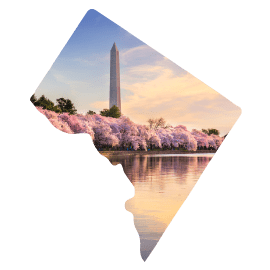Secondary Teacher Preparation in Science:
District of Columbia
Delivering Well Prepared Teachers Policy
Analysis of District of Columbia's policies
The District of Columbia offers a general science certification for secondary teachers. A minimum of six semester hours in each of the following is required: biology, chemistry, physics, earth and space science, and environmental science. Candidates must also pass the Praxis II "General Science" test. Teachers with this license are not limited to teaching general science but rather can teach any of the topical areas.
Middle school teachers in the District must complete a minimum of 30 semester hours in a content-related major. Commendably, candidates must also pass a Praxis II content knowledge test in the content area of the teaching assignment.
Recommendations for District of Columbia
Require secondary science teachers to pass tests of content knowledge for each science discipline they intend to teach.
States that allow general science certifications—and only require a general knowledge science exam—are not ensuring that these secondary teachers possess adequate subject-specific content knowledge. The District of Columbia's required assessment combines subject areas (e.g., biology, chemistry, physics) and does not report separate scores for each subject area. Therefore, candidates could answer many—perhaps all—chemistry questions, for example, incorrectly, yet still be licensed to teach chemistry to high school students.
State response to our analysis
The District of Columbia asserted that it requires testing and licensure in the following sciences: biology, chemistry and physics. Teachers in these subject areas are required to obtain subject-specific licensure.
The District added that the assertion that candidates may take the general science exam "yet still be licensed to teach chemistry to high school students" is incorrect. Teachers of the discrete sciences must obtain subject-specific licensure and take the relevant subject-specific licensure exams or be deemed "teaching out of field." A general science license is not the approrpiate license for teachers of the discrete science, hence the purpose of having licenses specific to the areas of biology, chemistry, and physics.
Last word
The area of concern is the District of Columbia's general science certification, not subject-specific science certifications. NCTQ is unable to find policy that limits teachers with a general science certificate to teach only general science courses. Rather than rely on assumed common understandings regarding which courses a teacher with a general science certificate may or may bot teach, the District of Columbia should articulate specific policy ensuring that all science teachers are required to pass a subject-specific content test for each area they plan to teach.
Select another topic
Delivering Well Prepared Teachers
- Admission into Preparation Programs
- Elementary Teacher Preparation
- Elementary Teacher Preparation in Reading Instruction
- Elementary Teacher Preparation in Mathematics
- Middle School Teacher Preparation
- Secondary Teacher Preparation
- Secondary Teacher Preparation in Science
- Secondary Teacher Preparation in Social Studies
- Special Education Teacher Preparation
- Assessing Professional Knowledge
- Student Teaching
- Teacher Preparation Program Accountability
Expanding the Pool of Teachers
Identifying Effective Teachers
- State Data Systems
- Evaluation of Effectiveness
- Frequency of Evaluations
- Tenure
- Licensure Advancement
- Equitable Distribution

